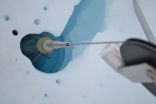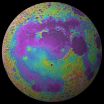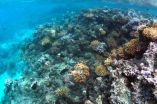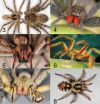(Press-News.org) To protect their gut microbes during illness, sick mice produce specialized sugars in the gut that feed their microbiota and maintain a healthy microbial balance. This protective mechanism also appears to help resist or tolerate additional harmful pathogens, and its disruption may play a role in human diseases such as Crohn's disease, report scientists from the University of Chicago in Nature on Oct 1.
"Both hosts and their gut microbiota can suffer in the case of sickness, but this mutually beneficial relationship is guarded by the host," said study senior author Alexander Chervonsky, MD, PhD, chairman of the Committee on Immunology at the University of Chicago.
When faced with systemic illness, animals eat less to conserve energy instead of foraging for food and to deprive pathogens of nutrients. However, this can harm beneficial gut bacteria, which have an important role in health and disease.
To investigate how microbiota might be supported during illness, Chervonsky and his team focused on a potential internal resource produced by the host – L-fucose, a sugar which has been shown to affect gut microbes. A host cannot use L-fucose for energy, but when bound to proteins, it can be used by microbes as a food source. Under normal conditions, however, the small intestine of mice produces almost no L-fucose.
The team exposed different types of mice to a molecule that mimicked a systemic infection. The mice became sick – eating less food, drinking less water and losing weight. Only a few hours after this induced sickness, the researchers observed that L-fucose was produced and present on almost every surface of the small intestine. This effect was seen only in response to illness.
The researchers then tested genetically engineered mice lacking Fut2, the gene responsible for L-fucose production. Healthy under normal conditions, mice without Fut2 regained weight after induced sickness – a measure of recovery – much slower than their normal counterparts. However, only mice with both intact gut microbiota and the ability to produce L-fucose recovered efficiently.
"Mice that can produce L-fucose recover better than those that can't," Chervonsky said. "If you remove bacteria the effect goes away."
The team used genetic analyses to confirm that gut microbes were affected metabolically by the production of L-fucose. As part of this analysis, they noted that sick mice without Fut2 had significantly greater expression of harmful microbial genes than normal mice. Hypothesizing that L-fucose production was somehow preventing opportunistic bacteria from expressing virulent genes, they exposed mice to a mild bacterial pathogen and then four days later induced sickness. Under this condition, mice without Fut2 lost significantly more weight than normal, suggesting that the production of L-fucose helps the host tolerate or resist additional harmful pathogens.
Interestingly, around 20 percent of humans lack a functional gene to produce L-fucose, a problem that has been associated with the inflammatory bowel ailment known as Crohn's disease.
"We speculate that without L-fucose, the activation of virulence genes cannot be blocked, and that's why bacteria play a role in Crohn's disease," Chervonsky said. "Whether we can use this toward therapeutics in the future requires further study."
INFORMATION:
The study, "Rapid fucosylation of intestinal epithelium sustains host–commensal symbiosis in sickness," was funded by the National Institutes of Health, National Science Foundation, the Harvard Bauer Fellows Program, the University of Chicago and a Kenneth Rainin Foundation Grant. Additional authors include Joseph M. Pickard, Corinne F. Maurice, Melissa A. Kinnebrew, Michael C. Abt, Dominik Schenten, Tatyana V. Golovkina, Said R. Bogatyrev, Rustem F. Ismagilov, Eric G. Pamer and Peter J. Turnbaugh.
Gut bacteria are protected by host during illness
Sick mice divert internal resources to protect beneficial gut bacteria, which appear to help fight infection, study finds
2014-10-01
ELSE PRESS RELEASES FROM THIS DATE:
New study explains wintertime ozone pollution in Utah oil and gas fields
2014-10-01
Chemicals released into the air by oil and gas exploration, extraction and related activities can spark reactions that lead to high levels of ozone in wintertime, high enough to exceed federal health standards, according to new NOAA-led research, published today in Nature.
The study comes at a time when new technologies are helping to accelerate oil and gas development in Utah's Uintah Basin, elsewhere in the United States and in many other countries, and its findings may help air quality managers determine how to best minimize the impact of ozone pollution.
When ozone ...
Evolving plumbing system beneath Greenland slows ice sheet as summer progresses
2014-10-01
AUSTIN, Texas—A team led by scientists at the University of Texas at Austin's Institute for Geophysics has for the first time directly observed multiple parts of Greenland's subglacial plumbing system and how that system evolves each summer to slow down the ice sheet's movement toward the sea.
These new observations could be important in accurately modeling Greenland's future response to climate change.
"Everyone wants to know what's happening under Greenland as it experiences more and more melt," said study coauthor Ginny Catania, a research scientist at the institute ...
Winter is coming ... to Titan's south pole
2014-10-01
Titan is unique in our solar system because of its dense nitrogen-methane atmosphere, which is very similar to Earth's in some ways, but very different in others. For example, air temperatures are around 200 degrees colder and, in contrast to the warm salt water seas of Earth, frigid hydrocarbon lakes populate Titan's surface.
Titan has seasons just like Earth, only each season lasts over seven years instead of three months due to its ponderous orbit around the Sun. After equinox in 2009, Titan's south pole entered the perpetual darkness of polar winter. Soon after, ...
Solving the mystery of the 'man in the moon'
2014-10-01
New data obtained by NASA's GRAIL mission reveals that the Procellarum region on the near side of the moon — a giant basin often referred to as the "man in the moon" — likely arose not from a massive asteroid strike, but from a large plume of magma deep within the moon's interior.
The Procellarum region is a roughly circular, volcanic terrain some 1,800 miles in diameter — nearly as wide as the United States. One hypothesis suggested that it was formed by a massive impact, in which case it would have been the largest impact basin on the moon. Subsequent asteroid collisions ...
Origin of moon's 'ocean of storms' revealed
2014-10-01
PROVIDENCE, R.I. [Brown University] — Oceanus Procellarum, a vast dark patch visible on the western edge of the Moon's near side, has long been a source of mystery for planetary scientists. Some have suggested that the "ocean of storms" is part of a giant basin formed by an asteroid impact early in the Moon's history. But new research published today in Nature deals a pretty big blow to the impact theory.
The new study, based on data from NASA's GRAIL mission, found a series of linear gravitational anomalies forming a giant rectangle, nearly 1,600 miles across, running ...
Researchers develop novel gene/cell therapy approach for lung disease
2014-10-01
CINCINNATI – Researchers developed a new type of cell transplantation to treat mice mimicking a rare lung disease that one day could be used to treat this and other human lung diseases caused by dysfunctional immune cells.
Scientists at Cincinnati Children's Hospital Medical Center report their findings in a study posted online Oct. 1 by Nature. In the study, the authors used macrophages, a type of immune cell that helps collect and remove used molecules and cell debris from the body.
They transplanted either normal or gene-corrected macrophages into the respiratory ...
New frontier in error-correcting codes
2014-10-01
CAMBRIDGE, Mass--Error-correcting codes are one of the glories of the information age: They're what guarantee the flawless transmission of digital information over the airwaves or through copper wire, even in the presence of the corrupting influences that engineers call "noise."
But classical error-correcting codes work best with large chunks of data: The bigger the chunk, the higher the rate at which it can be transmitted error-free. In the Internet age, however, distributed computing is becoming more and more common, with devices repeatedly exchanging small chunks of ...
Coral reef winners and losers
2014-10-01
Contrary to the popular research-based assumption that the world's coral reefs are doomed, a new longitudinal study from UC Santa Barbara's National Center for Ecological Analysis and Synthesis (NCEAS) paints a brighter picture of how corals may fare in the future.
An NCEAS working group reports that there will be winners and losers among coral species facing increasing natural and human-caused stressors. However, its experts demonstrate that a subset of the present coral fauna will likely populate the world's oceans as water temperatures continue to rise. The findings ...
Proving 'group selection'
2014-10-01
PITTSBURGH—The notion of "group selection"—that members of social species exhibit individual behavioral traits that render a population more or less fit for survival—has been bandied about in evolutionary biology since Darwin. The essence of the argument against the theory is that it's a "fuzzy" concept without the precision of gene-based selection.
Jonathan Pruitt, assistant professor of behavioral ecology in the University of Pittsburgh's Department of Biological Sciences within the Kenneth P. Dietrich School of Arts and Sciences, has published a paper today in the ...
New study provides key to identifying spiders in international cargo
2014-10-01
Spiders found in international cargo brought into North America are sometimes submitted to arachnologists for identification. Often, these spiders are presumed to be of medical importance because of their size or similarity to spiders that are known to be venomous.
In 2006, after witnessing multiple episodes where harmless spiders were mistaken for toxic ones, Dr. Richard Vetter, an arachnologist at the University of California, asked other arachnologists to provide data on specimens they found in international cargo that had been submitted to them for identification. ...
LAST 30 PRESS RELEASES:
Giant resistivity reduction in thin film a key step towards next-gen electronics for AI
First pregnancy with AI-guided sperm recovery method developed at Columbia
Global study reveals how bacteria shape the health of lakes and reservoirs
Biochar reimagined: Scientists unlock record-breaking strength in wood-derived carbon
Synthesis of seven quebracho indole alkaloids using "antenna ligands" in 7-10 steps, including three first-ever asymmetric syntheses
BioOne and Max Planck Society sign 3-year agreement to include subscribe to open pilot
How the arts and science can jointly protect nature
Student's unexpected rise as a researcher leads to critical new insights into HPV
Ominous false alarm in the kidney
MSK Research Highlights, October 31, 2025
Lisbon to host world’s largest conference on ecosystem restoration in 2027, led by researcher from the Faculty of Sciences, University of Lisbon
Electrocatalysis with dual functionality – an overview
Scripps Research awarded $6.9 million by NIH to crack the code of lasting HIV vaccine protection
New post-hoc analysis shows patients whose clinicians had access to GeneSight results for depression treatment are more likely to feel better sooner
First transplant in pigs of modified porcine kidneys with human renal organoids
Reinforcement learning and blockchain: new strategies to secure the Internet of Medical Things
Autograph: A higher-accuracy and faster framework for compute-intensive programs
Expansion microscopy helps chart the planktonic universe
Small bat hunts like lions – only better
As Medicaid work requirements loom, U-M study finds links between coverage, better health and higher employment
Manifestations of structural racism and inequities in cardiovascular health across US neighborhoods
Prescribing trends of glucagon-like peptide 1 receptor agonists for type 2 diabetes or obesity
Continuous glucose monitoring frequency and glycemic control in people with type 2 diabetes
Bimodal tactile tomography with bayesian sequential palpation for intracavitary microstructure profiling and segmentation
IEEE study reviews novel photonics breakthroughs of 2024
New method for intentional control of bionic prostheses
Obesity treatment risks becoming a ‘two-tier system’, researchers warn
Researchers discuss gaps, obstacles and solutions for contraception
Disrupted connectivity of the brainstem ascending reticular activating system nuclei-left parahippocampal gyrus could reveal mechanisms of delirium following basal ganglia intracerebral hemorrhage
Federated metadata-constrained iRadonMAP framework with mutual learning for all-in-one computed tomography imaging
[Press-News.org] Gut bacteria are protected by host during illnessSick mice divert internal resources to protect beneficial gut bacteria, which appear to help fight infection, study finds



